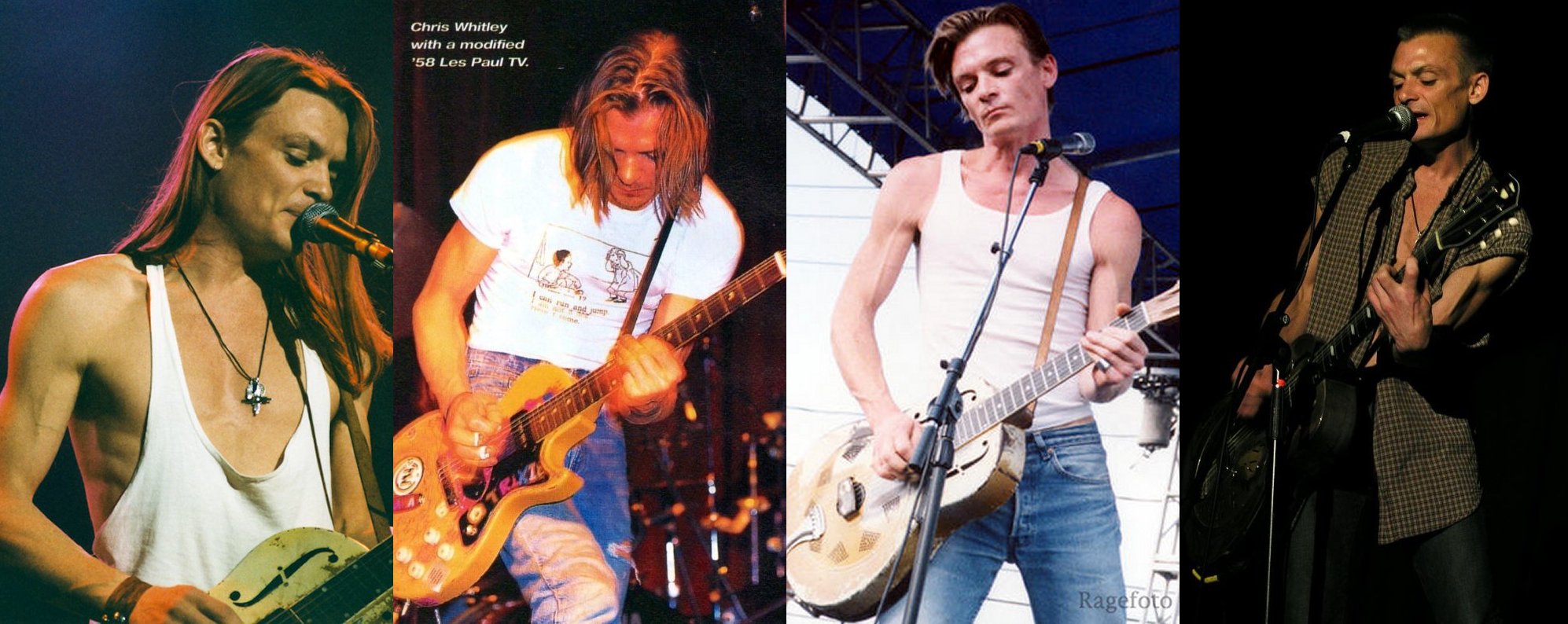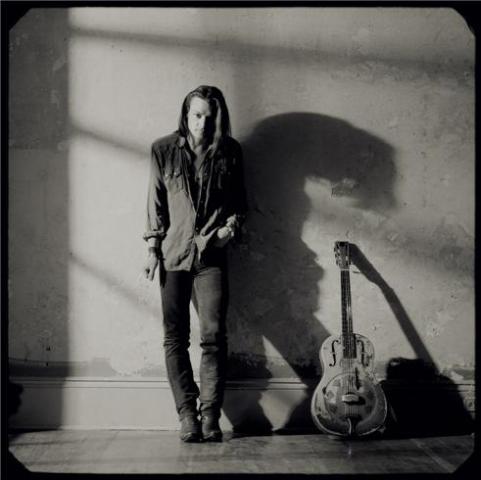Stories vary regarding how Chris came to meet Daniel Lanois, who was instrumental in getting Chris a recording contract and supported him during the recording process. Did they meet when Chris was playing a NYC gig at Mondo Cane? One Sunday morning when Chris joined a friend on a photo shoot in a NYC park? At a barbeque in New Orleans?
I didn’t know the “real story” until I purchased some artist’s proofs from photographer Karen Kuehn (she shot the iconic photo of Chris among the santarios). It seems that Karen met Chris when he played a gig at the Exterminator Chili restaurant on Church Street in NYC. Instead of throwing cash in the tip jar, she gave him a note “good for one free photo shoot” and told her boyfriend Dan Lanois that he had to hear Chris. Chris eventually took her up on her offer, and they became good friends.
Invited to join Lanois in New Orleans, Chris said that he “cleaned his house and hung out with other musicians. But while Lanois was busy doing [other] albums, I met Malcolm Burn, a young producer who didn’t intimidate me as much as Lanois.” Living with the Law was recorded in Lanois’ home studio in a house that Chris said “influenced this record, all the people and the way they live there and stuff. The room there, it’s a big room, and the way they record, it’s not like a controlled environment. It’s more like setting yourself to feel with the music.” [LA Times, Aug 18, 1991] In fact, the recording was done late in the day, the studio often lit only by candlelight, as shown in this video.
[Extra: For a vivid description of Chris’s time in New Orleans and more about the recording sessions, see Chris Whitley Lives with the Law.]
A Brilliant Debut …
Few debut albums get the promotion Columbia Records (now Sony Music) provided for LWTL. . As Graham Reid noted,
[T]he company sent out postcards to “tastemakers” and followed up a few days later with an advance promotional cassette mailout. Whitley undertook a promotional tour in June and sample 12 inches were sent to college radio. A full CD Digipak was sent to “taste-makers” on June 18 and the following day the promo CD … was blitzed to AOR/ALT radio stations. …. Teaser ads were placed in various significant publications and after the album was eventually released on July 2 there were full-color ads in magazines such as Billboard, Spin, Musician, and Guitar.

All that promotion certainly garnered a lot of interest, and the fact that the album was not only very good but also unique and timely guaranteed press interest. Time Magazine featured Chris among its “New Troubadours,” singer/songwriters who create “highly personal rock ‘n’ roll” and whose songs “have passion, intimacy and a shared but singular voice.” And the reviews? Uniformly laudatory!
Paul Evans, Rolling Stone: Chris Whitley’s extraordinary debut album, is fantasy blues – bona fide poetry and National steel guitar conjuring dream imagery from some surreal western movie. Riveting and original, Whitley mines roots music not as an imitator but as a visionary who trades on archetypal symbols and classic riffs to fashion his own twilit American mythology. …. [T]here hasn’t been music as wise as Whitley’s in quite some time.
Karen Schoemer, New York Times: “Living with the Law” is about dust, danger, two-lane roads and barren lndscapes; it’s about running and feeling like an outlaw, not so much in the literal as in the emotional sense of being detached and therefore free, of being at home on the outskirts of right and wrong. Most of his songs are set just south of nowhere.
JT Griffith, All Music Guide: An exceptional and mesmerizing debut, one with the potential to inspire all who hear it. An album Robert Johnson may have recorded, were he still alive.
Musician: What ultimately makes Living with the Law such an arresting debut are the songs, artfully drawn and insinuatingly tuneful, coming as close to short-story writing as anything that can be hummed. An utterly addictive album.
Tom Moon, Philadelphia Inquirer: Whitley … makes grand nomad music. It’s the kind of sound you’d expect from the desert – big and open, with delicate textures and stray, lonesome sounds, and lyrics that glorify solitude and the end of a wild adolescence. …. That’s Whitley’s gift – the ability to juxtapose man’s loftiest impulses with the reality of street life. Because the settings are so understated, it’s impossible to miss the drama in these songs. Even when he’s doing nothing more than celebrating the “Big Sky Country” that inspires him, Whitley turns in poignant, edge-of-the-chair performances that signal the arrival of a major voice.
Greg Kot, Chicago Tribune: “Living With the Law” announces the arrival of a new songwriter/guitarist who plays and sings the white-boy blues with more conviction and authority than anyone since the debuts of Ry Cooder and Lowell George….. [Chris Whitley’s] vivid story songs are contemporary jewels.
Boston Globe: Originality is rare today in any medium, so it’s a double treat to run across this exquisite new album. …. [Whitley’s] unusual bent-note singing and spare but deeply affecting lyrics mark him as a true discovery. Songs like “Living With the Law,” “Big Sky Country” and “Phone Call from Leavenworth” linger long after the music ends.
… But Not to Chris’s Liking?
As well-received as LWTL was, Chris didn’t particularly like the album. “Hated” might be a bit of an exaggeration, but Chris strongly believed that the album’s production — so widely praised by critics and so eagerly embraced by fans — didn’t reflect his “sound.” In an interview with the Times-Picayune, Chris said
“I just feel like I have made a record and I have toured for a year and I can look back on it and say, ‘Why has some of this been dissatisfying? Why have I had to explain myself away so many times … like what I was doing was not apparent at all?'”
“I think it has been appreciated for different reasons than I would have [it]. That’s why a lot of the time, a lot of the praises it got, I couldn’t completely say, ‘Yeah, well, thanks, you know, that’s great.'”
“I think it’s very listenable and I like the way it sounds. It doesn’t really sound like me, particularly, at least not completely. It has elements of where I’m at but it’s not like the whole thing. I feel like the record is much more excruciating than it sounds, honestly.”
In various interviews, Chris described the album as “precious,” not “as gnarly as when I play them alone,” “a little too pretty.” He repeatedly notes that, except for “Big Sky Country,” all the songs on LWTL were meant to be played solo — just Chris, his guitar, and his boot. “When I play the songs off ‘Living’ solo, they’re me. I was working in a picture frame factory in Brooklyn. I didn’t have a band, so they were written as solo works.” [Phil Inq 6-23-95]
[UPDATE – Jan 18, 2023: Thanks to Koyl Noiseengineering, a member of the ATCW FB group, we have a fellow guitarist’s (Knox Chandler) view of how stark was the difference between Whitley solo vs. Whitley on LWTL (from Guitar Moderne YouTube channel):
Chris also rejected the singer/songwriter, Americana, rootsy pigeon-hole that he was stuck in. Singer/songwriter: “It’s self-important. You can play something in a way that it gets corny. I combat that in myself a lot because I feel like I write romantically, which is always melodrama on a certain level.” [Press of AtlCty, 8-7-1995] Rootsy? “”I feel more — I dunno — acid-rock. …. I guess everyone needs a reference point … I guess I do sound old-fashioned when compared with Paula Abdul.” And the to-die-for Time article? “Man, to be honest, that Time thing bothers me. …. Fuck, that guy should have listened to the record.” [*]
A Kiss of Death?
As contradictory as it may seem, I’ve concluded that Malcolm Burn’s masterful, beautiful, and original production of LWTL both launched Chris’s career and signed its death certificate. As Chris noted above, LWTL is beautiful, and it certainly got our attention; but, ultimately, it did not reflect “the sound” Chris wanted to make. You might say that LWTL made a false promise: It suggested that we could expect more of the same in future releases.
Not so! As much as I loved LWTL (actually wore out my first CD and had to repurchase), I was shocked and utterly repelled by Din of Ecstacy. Couldn’t listen to more than a few seconds of each track before skipping to the next. Ultimately threw the CD in an odds-n-ends drawer, where it languished for years. When I purchased Live at Martyrs’, I thought, “Gee, Chris must have written several new songs that I missed.” Hearing “Narcotic Prayer,” “WPL,” “God Thing,” and other Din songs performed acoustically, I loved them! “New Machine”? One of my all-time favorites!
Many fans of LWTL had a similar reaction to Din. Donny Ienner, the Columbia/Sony chief who signed Chris on a 3-record contract, was especially dismayed. In the latest cut of the Dust Radio documentary, Ienner seems genuinely confused by Chris’s musical trajectory and mourns the “dark turn” his lyrics, his sound, and his life took from Din on. Kathleen Carey – the music publisher who promoted a LWTL demo to Ienner – dittos those feelings. As I watched their interviews, I repeatedly thought, “What’s so cheerful about LWTL? Poison girl, Leavenworth prison, ‘Momma cry and Daddy moan/Starving in some trailer home/Want to burn it down….,’ ‘I do my dreaming with a gun….’?” Granted the sound paints beautiful pictures, but the lyrics certainly do not.
Thus, the conundrum, enigma, dilemma of Chris Whitley’s musical career: to achieve recognition and commercial success, he had to not sound the way he was meant to sound. Would you have noticed LWTL if it had been presented with the same sparse production as Dirt Floor? Would you have ever even heard any of its songs? Not the kind of tunes that get a lot of play on most radio stations, right?
So. I am eternally grateful to Malcolm Burn for producing LWTL in a way that got Kathleen Carey’s attention, Donnie Ienner’s attention, the critics’ attention, the DJs’ attention, and, ultimately, my attention. Because I was so blown away by LWTL, I kept coming back to sample whatever Chris Whitley did and therein discovered the soundtrack to my life: that inexpressible something – Truth? – conveyed by his words and sounds. As I’ve noted in another post, LWTL “baptized me in the Church of Chris Whitley,” touched me in a way that no other musician has ever matched. Over the years, my faith has been simplified and purified. Today, my favorite Chris Whitley? Anything “straight”: just his voice, his guitar, and his boot. I guess you could call it “old-time religion.”



‘Baptized…in the Church of Chris Whitley’…like so many others I was seduced by LWTL. His sound was different but it was the lyrics that reeled me in. I kept ‘She used my body like a carrion crow’ on a post-it note on my desk for years. His CDs are still in heavy rotation at my house and I still introduce people to his music.
LikeLike
I first heard that falsetto of his while traveling over the Golden Gate in 91. I emeddiatly became obsessed. Priority, must obtain Living with the Law.
His visceral writing style with the resonance of national steel and his voice. Robert Johnson would of been a fan.
LikeLike
Lovely essay. Back when it came out, LWTL was one of my most favourite albums, it was like the soundtrack of my life for that whole year. I remember feeling so…. lost when DIN came out, I was warned by negative reviews in the British press over here but it was such a shock, and hearing of him so unhappy with that first achingly beautiful album. I couldn’t figure it out. Took awhile to get caught up by Chris’ music again with his later stuff, and then he was gone. Looking back at all of them, as a whole, his albums all make sense in a strange way, but that’s the perspective of looking back at his whole life’s work; at the time, LWTL certainly set up the wrong conception of what his music was.
LikeLike
Glad you enjoyed the article, Ghost. I think in their acoustic versions all Chris’ music is very unified and not at all a major shift from LWTL.
LikeLike
I loved narcotic prayer the first time thru thefirst verse,that great sardonic voice and originality in the chord Voicings…glorioso…isn’t dust radio acidic? Art bergmann
LikeLike
Wow, this is cool. Malcolm shared it with me. You still at it?
LikeLike
Hi, Sean – Glad you enjoyed my essay. Malcolm Burn? Possibly? If so, please convey my appreciation to him. Yes, still at it: recently posted a series on the tunes Chris covered (e.g., on Perfect Day, Dislocation Blues, etc.) Hey, if you’re in contact with Malcolm, perhaps you could do me a favor and steer him to https://allthingschriswhitley.wordpress.com/?attachment_id=769 . It’s a song (listed as Rain of Clay on the bootleg file) Chris played but we can’t identify. Cover? Original composition? Thanks either way.
LikeLike
Ran across these much later (after HVH but as working on SDS, so probably 2004) comments from Chris, suggesting he had “found peace” with LWTL:
MW: But I’d heard once that you hated that album [LWTL]. That you felt like you sold out. Do you like that song now?
CW: I do. Yeah, I do. I didn’t allow myself to like that record for the longest while. Not for the first couple of years. And this is funny, now I’m doing a record with the same guy who had done that record. We hadn’t talked for the longest time, 7 years. Keyboard player and engineer. He won a Grammy last year for Emmy Lou Harris.
But back then I had never been in the studio or even been produced before; so I was kind of pissed off… pissed off I wasn’t more involved. Man, I didn’t even know how to be more involved. I didn’t know what guitar sounds I was looking for.
LikeLike
I think Weed made LWTL as excruciating as it was supposed to sound in the first place. God bless him
LikeLike
Good insight, Michael. Just listened again to Weed version, and the plaintive quality is certainly stronger.
LikeLike
I really enjoyed this. I’m going to have to stew on the “acid rock” thing a bit. Was that just a phase he was feeling as he was stepping into DIN or was that a natural center that he had to abandon after DIN flopped? Hmmmm…
LikeLike
I think that Din was just something he needed to get out of his system – not in a bad way, mind you. Chris frequently commented that he had grown up on Led Zeppelin (sp?) and Hendrix and needed to do the “power trio” thing – and he did it well. And some of his last albums were essentially trios: HVH with Heiko and Matthias and SDS with H, M, and Malcolm Burn.
LikeLike
This was fantastic!
LikeLike
Thanks, George. If you haven’t already done so, be sure to check out the other CW fan sites on Facebook and SoundCloud
LikeLike
Update: In email correspondence with Karen Kuehn, I learned that she is the photographer who took the iconic “Chris among the Santarios” photo. Karen heard Chris playing (busking) in NYC, liked his sound, and, as a tip, gave him a “one free photo shoot” card. She was dating Daniel Lanois at the time, and introduced Lanois and Chris. The rest is history….
LikeLike
For more info about Chris’s initial reaction to the press rush, see http://www.elsewhere.co.nz/absoluteelsewhere/3097/chris-whitley-interviewed-1991-the-law-man-living-with-the-lore/.
LikeLike